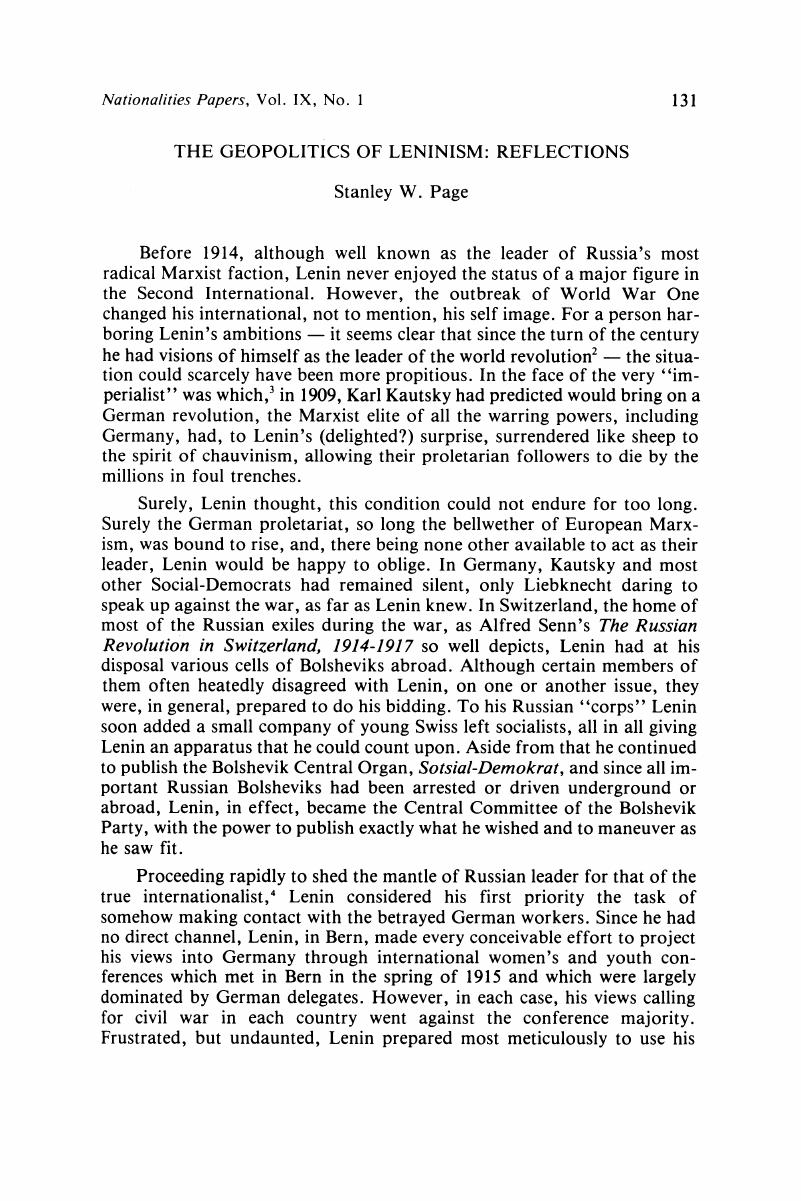No CrossRef data available.
Published online by Cambridge University Press: 20 November 2018

1. These reflections constitute the final chapter of a manuscript presently being read for publication. Documentation, therefore, is incomplete because the documentation is contained in the preceding chapters. I offer this portion for publication now because the manuscript's special concern is the Leninist rationalization of Soviet annexationism as a revolutionary democratic uniting of “fraternal” peoples, something of great interest to the readers of Nationalities Papers. What Lenin meant by the term “self determination” is by now well understood. My book attempts to explain how its formulation evolved in Lenin's mind.Google Scholar
2. Even before 1900, Lenin had “proved” statistically that Russia was capitalistic. He had bolstered Plekhanov's earlier contentions with elaborate evidence, which, as Neil Harding writes, had been “unavailable to Plekhanov when he formulated his ideas.” (N. Harding, Lenin's Political Thought. Vol. I Theory and Practice in the Democratic Revolution. London, 1977, p. 98.) In that way Lenin linked the Russian revolutionary movement (and himself) to Western revolutionary currents. In What Is To Be Done? (written 1900–1902) Lenin shoved Russia to stage center as the world's leading Marxist nation, at the same time elevating himself to the status of European Marxist leader. The pamphlet states that history had given Russia's proletariat the “most revolutionary” of all the “immediate tasks facing the proletariat of any other country” that being the destruction of tsarism, “the most powerful bulwark” of both European and Asian reaction. (V. I. Lenin, Collected Works (Moscow, 1964) Vol. V, p. 373.)Google Scholar
3. Lenin makes note of that in Sotsial-Demokrat, December 12, 1914.Google Scholar
4. The following observation was made by a person who attended a Zürich lecture by Lenin in November, 1914. “Here we are now in a region of heavy industry. Comrade Lenin represents a land of fools and slaves but acts like an authority on socialism before whom all tremble. Taking a vacation from Bolshevism, the careerist depicts himself as Ferdinand of Spain — ‘I shall save internationalism, I give you revolution; a new tactic.’ There you have it! This is Bolshevism transposed to a place where European attitudes prevail.” (Leninskii Sbornik, Moscow, 1930, XIV, p. 141.)Google Scholar
5. See S. W. Page, “Lenin's Assumption of International Proletarian Leadership,” The Journal of Modern History, September, 1954.Google Scholar
6. That this was Lenin's scheme may be readily deduced simply by noting how after the Bolshevik seizure of power the Red Army was sent into Ukraine, Belorussia, Finland, Estonia, Latvia, Lithuania, Transcaucasia, Poland and Central Asia. The same script, originally written to accomodate a German revolution, was used in attempts, mostly successful, to give military support to every Bolshevik clique, which, after ousting a nation's “bourgeois-democratic” regime became Russian-controlled puppets.Google Scholar
7. O. Gankin and H. Fisher, The Bolsheviks in the World War (Stanford, 1940) p. 220.Google Scholar
8. Referring to Engels’ 1875 letter to Bebel, Lenin cites, as having “the greatest possible importance to the question of the state,” the following passage: “The free people's state is changed into the free state. Grammatically, a free state is one in which the state is free from restrictions of its citizens, that is, a despotic state. One should drop the whole talk of a state, especially since the time of the Commune, which was no longer a state in the true sense of the word … The Communist Manifesto clearly says that the state dissolves of itself and disappears with the introduction of the socialistic economic structure. Since the state is therefore only a transitional phenomenon, used for the purpose of holding down one's opponents in the revolutionary struggle, it becomes pure nonsense to speak of the free people's state, so long as the proletariat still needs the state, not in the interests of freedom, but to restrain its opponents, and as soon as one can speak of freedom, the state, as such, ceases to exist. (Leniniskii Sbornik, XIV, pp. 250-253.)Google Scholar
9. Lenin, Collected Works. Vol. 28, p. 254. “The transition from capitalism to communism takes an entire historical epoch. Until this epoch is over, the exploiters inevitably cherish the hope of restoration, and this hope turns into attempts at restoration. … In these circumstances, in an epoch of desperately acute war, when history presents the question of whether … thousand year-old privileges are to be or not to be — at such a time to talk … about pure democracy, about dictatorship being unnecessary…. What infinite stupidity and abysmal philistinism are needed for this!”Google Scholar
10. See S. W. Page, “Lenin's April Theses and the Latvian Peasant-Soldiery,” in Reconsiderations on the Russian Revolution. Ed. R. C. Elwood (Cambridge, 1976).Google Scholar
11. Early in 1919 the Riga Soviet laid down “guiding lines for the Red Army in Latvia,” (made up largely of Latvian troops). Latvia was described as the “gateway through which the Russian Revolution must invade Western Europe.” It was to “reach the Prussian frontier as quickly” as possible. “An advance of the Red Army into Germany promises to be most successful…. The divisions of the Red Army … in Latvia have to deliver the decisive blow.”Google Scholar
12. See S. W. Page, “Lenin, Prophet of Revolution from the East,” The Russian Review, April, 1952.Google Scholar
13. For a detailed account of this see S. W. Page, Lenin and World Revolution (New York, 1959) Chapter XII.Google Scholar